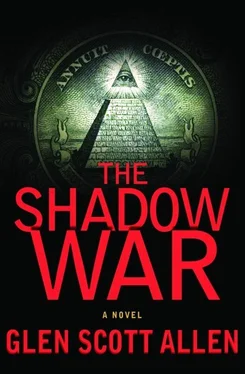Glen Allen - The shadow war
Здесь есть возможность читать онлайн «Glen Allen - The shadow war» весь текст электронной книги совершенно бесплатно (целиком полную версию без сокращений). В некоторых случаях можно слушать аудио, скачать через торрент в формате fb2 и присутствует краткое содержание. Жанр: Триллер, на английском языке. Описание произведения, (предисловие) а так же отзывы посетителей доступны на портале библиотеки ЛибКат.
- Название:The shadow war
- Автор:
- Жанр:
- Год:неизвестен
- ISBN:нет данных
- Рейтинг книги:5 / 5. Голосов: 1
-
Избранное:Добавить в избранное
- Отзывы:
-
Ваша оценка:
- 100
- 1
- 2
- 3
- 4
- 5
The shadow war: краткое содержание, описание и аннотация
Предлагаем к чтению аннотацию, описание, краткое содержание или предисловие (зависит от того, что написал сам автор книги «The shadow war»). Если вы не нашли необходимую информацию о книге — напишите в комментариях, мы постараемся отыскать её.
The shadow war — читать онлайн бесплатно полную книгу (весь текст) целиком
Ниже представлен текст книги, разбитый по страницам. Система сохранения места последней прочитанной страницы, позволяет с удобством читать онлайн бесплатно книгу «The shadow war», без необходимости каждый раз заново искать на чём Вы остановились. Поставьте закладку, и сможете в любой момент перейти на страницу, на которой закончили чтение.
Интервал:
Закладка:
But then Natalya had always been an outsider. Her looks reflected her mother's lineage-Finnish, not Slavic-with her high cheekbones, brilliant, almost white-blond hair, and blue-green eyes, she was unique among all the brown-haired, wide-faced, flat-nosed children in the military town's state school. "Rusalka," mermaid, the teachers had called her: something exotic, foreign. Suspect.
Even the way she had dressed marked her as an exception. "It's the nail that sticks up that gets hammered down," her mother's father had warned her. Exhibiting a taste for Western styles back then was considered almost tantamount to treason: the short skirts, the bright colors, the high-heeled shoes. Not the tastes of a true sovok, a loyal Soviet citizen. She still remembered vividly the old babushkas on the street, shouting after her when she walked by in such clothes. Zapadnaya, they called her: Western girl. And much worse.
Now of course everything had changed. Down was up. What had been foreign and bad was now stylish and good.
And Natalya used it to her advantage. Her looks, her Western manner, her command of colloquial English-all had gotten her a posting in the Washington embassy of the Russian Federation in Washington, D.C., at a time in her life when she should still have been stamping visa applications in a gray basement office somewhere in Moscow. And there were perks.
For instance, before she'd stopped in to "advise" Yuri in his monitoring of "interviews," she'd been headed to make final arrangements for the coming reception for the Bolshoi Ballet. The social event would certainly be a break in her routine-but she didn't relish the thought of being patronized by Madame Zenova, the aging ballet prima, complete with purple-feathered boa.
Zenova had already visited the RCC that day, whisking around with her trailing entourage, looking at everyone through lowered eyelids, playing the part of fickle diva to perfection. And Natalya knew she would be just one of many nameless functionaries at the reception, invited more because of her looks than her importance; all part of the show for the American Washington insiders, all a demonstration of just how thoroughly over the bad old gray days of the Soviet era were.
But to keep the perks she had to occasionally do her actual job, regardless how tedious.
Muttering a curt greeting of "Privet" to a few colleagues-it was four thirty and most of the staff had left for the day-she wound her way to a small desk set in a corner.
Before her was a stack of mail she'd brought with her from the RCC; somehow going through it at the embassy made it seem more important. It was work that demanded little of her training and provided few opportunities for her powers of "creative interpretation"-the kind she'd demonstrated for Yuri.
Working her way through the stack of mail and messages on her desk, she found them to be for the most part the usual sort of communiques: a request for access to archives of the Organization of Security and Cooperation in Europe by a student at Harvard's Kennedy School of Government writing a dissertation, "Cultural Schisms and the Deformation of International Law by National Codes of Justice"-it made her head ache just to read the title; a letter from a museum in Philadelphia asking for slides of the new exhibit in the RCC's "Russian-American Room"-a stultifying display of joint agricultural projects she thought better suited to the 1950s; a letter addressed to Ambassador Extraordinary and Plenipotentiary Vasily I. Schastny-she had no idea how that one had found its way into her pile; it should have gone to the ambassador's secretarial pool.
Then she came across an envelope that immediately struck her as strange. It was an ordinary enough eight-by-eleven white envelope, but it bore no institutional return label-just a P.O. box number somewhere in Massachusetts-and held a U.S. postal stamp rather than the usual machine mark of bulk mail. And it was hand-addressed to her personally: Ms. Natalya N. Orlova, Cultural Attache, Russian Cultural Centre. She noticed the British spelling of the word "centre."
Using one of her stylishly long red fingernails-she was forever misplacing the silver Imperial Russia reproduction letter opener Yuri had given her after he watched her opening her mail this way-she slit open the envelope.
The letter inside was strange, too.
It was handwritten in Russian. Not particularly good Russian, but at least the writer was making an effort; nearly all American correspondents just assumed a cultural attache would read and write English. The writer (it said) was looking for any information regarding a book, published sometime between 1960 and 1970, titled Stzenariy 55, or perhaps Borba s tenyu. But he wasn't certain of that title, he wrote; it could be some other version of those words.
Script fifty-five? she thought. That could mean almost anything. And the second is… very strange indeed.
Borba had many possible meanings: fighting, struggle, conflict. And tenyu wasn't any more specific, referring to twilight or shade, or simply dim light.
Fighting with Shade? Fighting in the Twilight?
But those translations were literal, and Natalya knew that literal translations almost never caught the real meaning of a phrase, especially a literary phrase.
In fact, she couldn't think of any English phrase that captured the real sense of the Russian: a weaker combatant struggling against a stronger and invisible force.
Now Natalya was intrigued… But it was late on a Friday evening, and she had a hectic, crowded subway trip ahead of her to her apartment near Dupont Circle. As curious as the request was, it would have to wait until Monday.
But before she put the letter away, she glanced at the bottom of the page, to the signature.
Iskrenne vash, the letter concluded. And it was signed in steep, angled writing difficult to read; but she finally made out the signature.
Jeremy Fletcher.
CHAPTER 3
Benjamin reentered the main building, passed through the darkened foyer and up the spiral staircase. The details of the gigantic mural were now even murkier, and vaguely threatening. When he reached the second floor, he saw a light coming from an open doorway down the hallway to the left. He went to the room, found Wolfe standing inside.
"This should do," Wolfe said, motioning him to enter. "All the perks of a private estate, none of the expenses. To say nothing of the first-class security."
"Yes," Benjamin said, "I noticed the fence and cameras on the way in."
"I wasn't talking about the fence," Wolfe replied. "But, here, we need provisions. I'll go scour the kitchen."
As Wolfe started to leave, Benjamin extracted his cell phone from his pocket, flipped it open.
Wolfe stopped. "What on earth are you doing?" he asked.
"I thought I'd better call a friend who's watching my cat, tell them I might be back tomorrow."
"Not on that, you won't," Wolfe said. "Cell phones don't work here. The whole campus is blanketed by a filter. You can only make a call through the landline," he pointed at the phone next to Benjamin's bed, "and if it's off campus, even that has to be scheduled."
"Oh," said Benjamin. "I didn't know."
"As I said," Wolfe smiled, "very secure." Then he turned to go. But as Wolfe reached the doorway, Benjamin said, "Before you go, may I ask, what happened to… to Jeremy?"
"Heart attack," Wolfe answered bluntly.
"Heart attack?" echoed Benjamin. "My god… But then, why-" Benjamin waved vaguely at Wolfe.
"Why a security analyst instead of the county medical examiner?" He smiled. "You know how submariners can be sure there are no leaks?" Benjamin shook his head. "They can't," Wolfe said, patting his shoulder. "So they're always checking. Always."
And then he went off in search of food.
Читать дальшеИнтервал:
Закладка:
Похожие книги на «The shadow war»
Представляем Вашему вниманию похожие книги на «The shadow war» списком для выбора. Мы отобрали схожую по названию и смыслу литературу в надежде предоставить читателям больше вариантов отыскать новые, интересные, ещё непрочитанные произведения.
Обсуждение, отзывы о книге «The shadow war» и просто собственные мнения читателей. Оставьте ваши комментарии, напишите, что Вы думаете о произведении, его смысле или главных героях. Укажите что конкретно понравилось, а что нет, и почему Вы так считаете.












